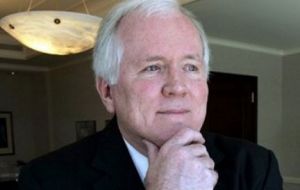MercoPress. South Atlantic News Agency
AIG chief admits “distasteful” excesses but points to the Fed
 Liddy: AIG is ”too complex, too unwieldy and too opaque
Liddy: AIG is ”too complex, too unwieldy and too opaque The boss of US insurer AIG has called the bonuses paid to executives “distasteful” and said he asked some recipients to return at least half. But Edward Liddy said the Federal Reserve knew in November of the 165 million US dollars bonus payments to executives that have caused such a furore in US.
“Mistakes were made at AIG on a scale that few could have imagined possible,” he told a Congressional hearing.
He also admitted that AIG is “too complex, too unwieldy and too opaque”.
Mr Liddy said that he had asked AIG executives receiving a bonus of more than 100.000 USD to pay at least half of it back.
The insurer has taken about 170 billion of aid from the US government, taxpayer’s money, which is why the bonus payments have caused such outrage.
US lawmakers are considering several different responses to the controversy and the House of Representatives Judiciary Committee on Wednesday approved legislation that seeks to recover the AIG bonuses.
President Barack Obama has also reiterated his anger at the bonus payments.
He referred to them as an “inappropriate use of taxpayer money”.
“Excess greed and excess compensation have made us all vulnerable,” he added.
The president called for a new model for economic growth that does not rely on the financial sector.
He also said that he and members of his economic council had begun discussions with lawmakers on legislation to create a new regulatory body to give the government more authority over financial institutions like AIG.
Mr Liddy appeared in front of the Congressional committee to answer questions about the bonuses and the plight of AIG.
Before Mr Liddy appeared before the committee, members of the committee expressed their anger, not just at the bonuses paid to AIG executives, but also at the 170 billion bail-out by the US government.
One referred to a “tidal wave of rage” throughout the US, while another called the US taxpayer “the ultimate sucker” in the whole AIG saga.
Mr Liddy said the company had “strayed from its core competencies in the insurance business”.
Nowhere was this more evident than in “the creation of what grew to become an internal hedge fund, which then became substantially overexposed to market risk,” he added.
Drastic action is now needed to claw back the massive losses that resulted from these risks, Mr Liddy said.
Notes accompanying the written testimony said that the insurer would undertake a “massive restructuring that will effectively break up the company and unlock value to repay taxpayers.”
Reports suggest that AIG is considering selling its New York headquarters and a nearby office block.
Mr Liddy also addressed the contentious issue of excessive bonuses.
“I am mindful of both the environment in which we are operating and of the president's call for a more restrained compensation system,” he said.
Mr Liddy has said that he would not have approved the 165 million bonuses if he had been chief executive at the time the contracts were signed.
“AIG has recently made a set of compensation payments, some of which I find distasteful,” he said.
Earlier this week, Barack Obama expressed anger at the bonuses, calling the payments “an outrage”.
“It's hard to understand how derivative traders at AIG warranted any bonuses, much less 165 million in extra pay,” he said.
US Treasury Secretary Tim Geithner has since said that the government will deduct the bonuses from government funds due to be paid to the insurer.
Mr Liddy, former chief executive of the Allstate insurance firm, took over at AIG in September, just days after it was saved from bankruptcy with an 85 billion lifeline from the government. The government has since pumped billions more into the troubled insurer, which reported a loss of 61.7 billion for the last three months of 2008 - the biggest quarterly loss in corporate history.




Top Comments
Disclaimer & comment rulesCommenting for this story is now closed.
If you have a Facebook account, become a fan and comment on our Facebook Page!